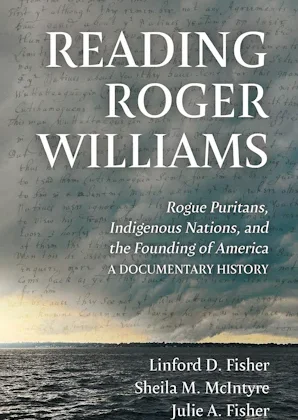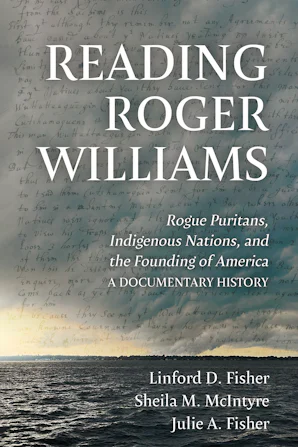

Linford D. Fisher is Associate Professor of History at Brown University, Sheila M. McIntyre is Associate Professor of History at the State University of New York at Potsdam, and Julie A. Fisher is a historian, educator, and editor. This interview is based on their new book, Reading Roger Williams: Rogue Puritans, Indigenous Nations, and the Founding of America — A Documentary History (Pickwick Publications, 2024).
JF: What led you to write Reading Roger Williams?
A: Roger Williams is perhaps one of the most-written about English colonists in the seventeenth century. He’s been claimed by so many writers for various purposes and causes, most often as the champion of democracy. He’s such a fascinating figure, seeming prescient of future beliefs that would become central to the United States. And he was radical, in many ways. Setting up a colony that gave full religious liberty and protections for public worship for Catholics, Baptists, non-conformists, Quakers, Jews, Muslims, and even atheists was a big deal. He helped create what was arguably the freest space in the early seventeenth century English world. And yes, he also separated church and state by insisting that the government should not religiously police the lives of its inhabitants. All of this is true and is pretty well known.
What we wanted to know was this: what happens when you put Roger Wililams’ grand ideas beside his actions as a settler committed to the English colonization project? Who emerges from that synthesis and what do we learn about him and early New England in this process? No one had done a one-volume collection of Williams texts since Perry Miller in 1953. There are several collected versions of his published writings, so some of his important books are well-known, like A Key Into the Language of America (1643). And there is a terrific 2-volume edition of his correspondence by Glenn LaFantasie that has incredibly helpful footnotes. But for some reason, these two sets of his writings–publications and letters–are rarely put in conversation. Plus, there was a new essay that had been decoded from his shorthand in 2014 that we could add to the mix.
To really get the full effect, we wanted to have the reader encounter his writings chronologically, situated in the everydayness of life, as Williams wrote them. The result is that you have to consider the Pequot War in immediate proximity to A Key Into the Language of America. It changes things, we think.
So when Wipf & Stock asked Sheila to take on this project, she asked Julie & Linford to join her. Little did we know it would take 10 years!
JF: In 2 sentences, what is the argument of Reading Roger Williams?
A: Roger Williams is usually known for his ideas, such as full religious liberty and the separation of church and state, and his supposedly friendly relations with Native Americans. This volume digs into his writings to reveal his conflicted and contradictory life, one in which he defended religious liberty and yet publicly attacked the Quakers; admired Native American cultures and yet often saw them as inferiors and personally took part in their enslavement and dispossession.
JF: Why do we need to read Reading Roger Williams?
A: You cannot understand Williams if you only count on other people to tell you about him. You have to read his words, and this volume helps you do that. Our book presents a more holistic view of Williams, in his context, with all of the messy, contradictory aspects of someone who bridged so many worlds. Instead of attempting to bolster the more romanticized view of him or turn him into purely a villain, this collection tries to strike a middle ground — appreciating his many contributions but also taking an unblinking look at his many shortcomings and participation in settler colonial processes.
We also think Williams may have something to say to us today! What if we took the best parts of him and really took them to heart? It wouldn’t be a bad thing if we took the separation of church and state seriously again, or if we truly respected people from all faith traditions. And maybe really genuinely advocating for the rights and lands of Indigenous peoples today would go a long way to begin to undo the harmful policies that Wiliams was part of and that continue to this day in many ways.
JF: Why and when did you become an American historian?
A: Linford: I grew up in Amish country, Pennsylvania, with a deep sense of history, although I did not really have the vocabulary for it until I was older. I also grew up completely ignorant of the region’s Native American history (other than the token William Penn stories). It wasn’t really until college and then grad school that I fully embraced history as a discipline that was so fundamentally useful for understanding the past and present. In a way, my career since then has been one continuous effort to understand lesser known, erased, and forgotten histories, all in hopes of creating a better future.
Sheila: My family are all storytellers, steeped in history – we were that family standing at the side of the road reading plaques. Dr. Al Riggs, my US History prof at McGill University, showed me that I could be a historian for real, and Dr. Alan Taylor (my dissertation advisor at BU) taught me how to be one. I became a documentary editor because I like reading other peoples’ mail and actually enjoy seventeenth-century handwriting.
Julie: My family believed in exploring American history so I spent many summers visiting National Parks, historical sites, and museums and I am very grateful for that. My first internship as a college student was at a historical site in the California State Park system. The history professor that introduced me to it as a profession was Dr. Ann Marie Plane and she would talk about her work at Plimoth Plantation. I remember thinking this “Plimoth” sounded very interesting but also very faraway. I had no idea I would be studying it one day.
JF: What is your next project?
A: Linford: I have two projects that are very close to completion. I’m wrapping up a 13-year-long book project on the history of Indigenous enslavement and land loss in English colonies and the United States between 1492 and 1970. I’ve greatly enjoyed traveling to archives in the Caribbean, the UK, and all over the US to track down the shifting story of Native American unfreedom in the US. The book is under contract with Norton / Liveright, and should be out in 2025. The second project is a tribal collaborative digital humanities project called Stolen Relations: Recovering Stories of Indigenous Enslavement in the Americas (www.stolenrelations.org). It’s been a joy to work with twelve regional tribal nations on this project, and we look forward to going public this summer or fall with approximately 7,000 entries as a first data dump. We are always looking for volunteers to help research and enter items into the database!
Sheila: I’m working on “begging letters” from the seventeenth and early eighteenth centuries – correspondence sent by poor people seeking basic essentials (food, wood) from wealthier neighbors. I am intrigued that even the desperately poor decided that a letter was their best means to get help, especially since most could not write the letter themselves.
Julie: No next projects for me anytime soon.
JF: Thanks, Linford, Sheila, and Julie!